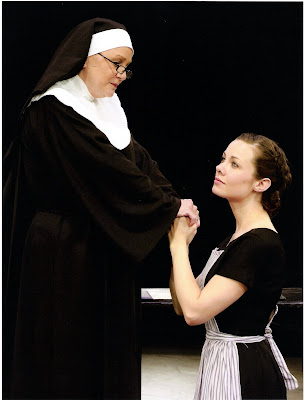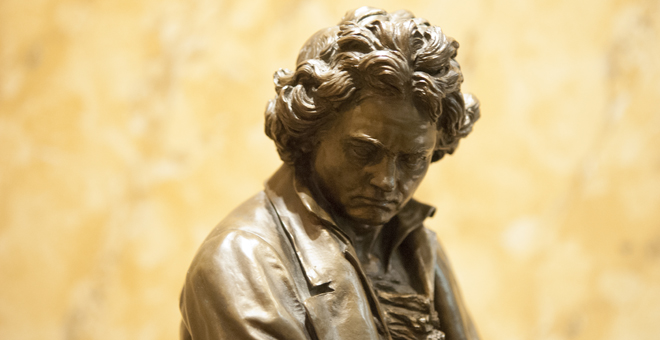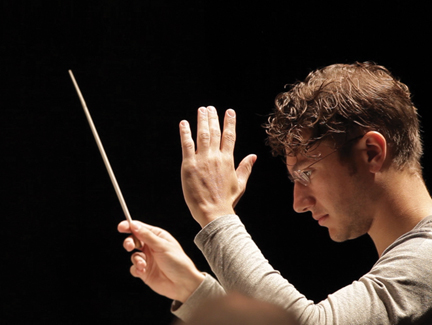 |
| Debbi King-Raque as The Mother Abbess and Kelly Sina as Maria in the Derby Dinner Playhouse production of Rodgers & Hammerstein’s “Sound of Music.” |
How do you solve the problem of over exposure? When everyone knows the story and the songs how do you create a fresh production that is more than a recitation? It isn’t easy and many productions of the Rodgers and Hammerstein classical musical The Sound of Music never leave base camp.
Because of limited resources and availability of performers small theatres often choose to focus their productions heavily on the incredible music, pushing the drama into a secondary position and ignoring the movement inherent in the story. Director Lee Buckholz, however, has chosen a company of triple-threats–actors who are also strong singers and dancers–in an attempt to realize the show’s full potential.
Bucholz has also avoided to temptation to model his production on the iconic 1965 film version starring Julie Andrews. For one thing Kelly Sina’s Maria is a coloratura rather than a lyric soprano. She doesn’t have Andrews’ high notes (who does?), which also means she takes less of a star turn; this gives the entire production the strength of ensemble. The fact that Sina and Brittany Carricato, who plays eldest daughter Liesl von Trapp, are so close in age creates an interesting dynamic by emphasizing Maria’s positional authority. Sina is believable as an innocent noviciate from Nonnberg Abbey and her growth throughout the play seems a natural progression.
Audiences will be pleased that Buckholz has included the oft-cut waltz between Liesl and Rolf, Matthew Brennan, that accompanies Sixteen Going on Seventeen. Choreographer Heather Paige Folsom’s work here and throughout the entire production is joyous. So often the children are simply marched into various choral positions and left to recite their parts. Buckholz and Folsom have given them life in this production. All of the children gave strong performances the night I saw the show, but I was particularly aware of Matthew Zolla as Kurt von Trapp whose male soprano shone through the ensemble, illuminating without casting a shadow.
This production also succeeded in creating the sense of limbo and underlying viscousness that must have preceded the Nazi invasion of Austria in March of 1938. As Herr Zeller, the local Nazi goon, J.R. Stuart avoids characterization that could have tipped Zeller from threat to clown. His performance is balanced by Brent Gettelfinger’s Admiral von Schreiber’s resigned acceptance of the Nazis as he gently urges Captain von Trapp, Brian Bowman, to accept the inevitability of his fate. Some of the funniest lines in the play are given to promoter Max Detweiler who ultimately provides the means of escape for the von Trapp clan. Detweiler is played by Kevin Crain, whose cleverly-timed comic jabs and double entendres provide much-needed counterpoint throughout.
In addition to directing the show Buckholz also designed the multi-purpose set that changes effortlessly from the Abbey to Maria’s Bedroom to the stage of an auditorium. With the help of costume designer Rachel French he achieves a strong visual to compliment the work of his actors.
Derby Dinner Playhouse’s production of the Sound of Music continues through August 7. For tickets and information go to www.DerbyDinner.com or call the box office: 812.288.8281.




